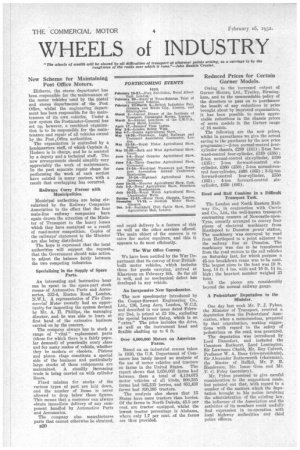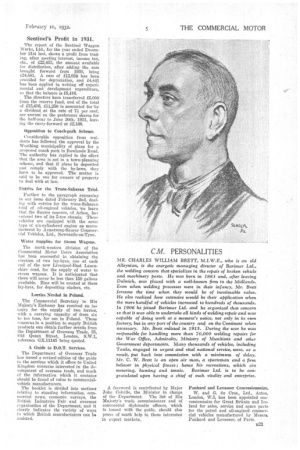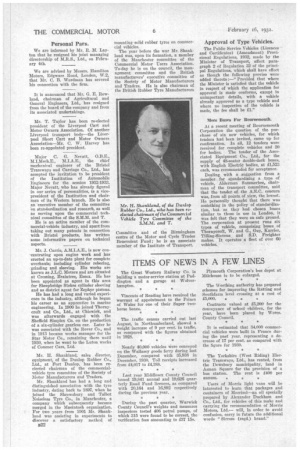WHEELS of INDUSTRY
Page 38

Page 39

Page 40

If you've noticed an error in this article please click here to report it so we can fix it.
"The wheels of wealth will' be slowed by all difficulties of transport at whatever points arising, as a carriage is by the
rougt.ness of the roads over which it runs."—John Beattie Crosier.
New Scheme for Maintaining Post Office Motors.
Hitherto, the stores department has been responsible for the maintenance of the motor vehicles used by the postal and stores departments of the Post Office, whilst the engineering department has been responsible for the maintenance of its own vehicles. Under a new system the Postmaster-General has set up, however, a combined organization is to be responsible for the maintenance and repair of all vehicles owned by the Post,, Office authorities.
The organization is controlled by a headquarters staff, of which Captain A. Hudson 19 in charge, and he is assisted by a deputy and a technical staff. The new arrangements should simplify very appreciably the work of maintenance. In the past separate repair shops for performing the work of each section have existed in many centres, with a result that overlapping has occurred.
Railways Curry Favour with Municipalities.
Municipal authorities are being circularized by the Railway Companies Association to the effect that the four main-line railway companies have again drawn the attention of the Minister of Transport to the heavy losses which they have sustained as a result of road-motor competition. Copies of the railways' statement to the Minister are also being distributed.
The hope is expressed that the local authorities will support the request, that the, Government should take action to adjust the balance fairly between the two competing industries.
Specializing in the Supply of Spare Parts.
An interesting and instructive hour can be spent in the spare-part stock roomsof Automotive Parts and Accessories, 3324, Euston Road, London, N.W.1. A representative of The Commercial Motor recently had an opportunity for inspecting the system devised by Mr. A. II. Phillips, the managing director, and he was able to learn at first hand of the extensive business carried on by the concern.
The company always has in stock a range of "vital" replacement parts (those for which there is a fairly popular demand) of practically every class and for many makes of vehicle, whether they be modern or obsolete. Pistons and piston rings constitute a special side of the business and particularly large stocks of these coMponents are maintained. A steadily increasing trade is being carried on with cylinder liners.
Fixed minima for stocks of the various types of part are laid down, and the number of items is never allowed to drop below those figures. This means that a customer can always obtain immediate delivery of any component handled by Automotive Parts and Accessories.
The company also manufactures parts that cannot otherwise be obtained, and rapid delivery is a feature of this as well as the other services offered. The main object of the concern is to cater for motor, repairers, and this it appears to do most efficiently.
The War Office Convoy.
We have been notified by the War Department that its convoy of four Britishbuilt motor vehicles, which includes three for goods carrying," arrived at Khartoum on February 8th. So far all is well, and no mechanical defect has developed in any vehicle.
An Inexpensive New Speedometer.
The new speedometer introduced by the Cooper-Stewart Engineering Co., Ltd., 136, Long Acre, London, W.C.2, and described in our issue dated February 2nd, is priced at £3 10s., excluding the special bayonet fixing, which is an "extra." The price includes the drive, as well as the instrument head and flexible shafting up to 6 ft.
Over 4,000,000 Motors on American Farms.
Based on an industrial census taken in 1930, the U.S. Department of Commerce has lately issued an analysis of the use of motor vehicles and tractors on farms in the United States. The report shows that 3,650,003 farms had between them a total of 4,134,675 motor vehicles of all kinds, 900,385 farms had 845,335 lorries, and 851,457 farms had 920,395 tractors.
The analysis also shows that 15 States have more tractors than lorries. Of the farms in North Dakota, 43.8 per cent. are tractor equipped, whilst the lowest tractor percentage is Alabama, where only IT per cent. of the farras are tires provided.
Reduced Prices for Certain Garner Models.
Owing to the increased output of Garner t'Motors, Ltd., Tyseley, Birmingham, and to the commendable policy of the directors to pass on to purchasers the benefit of any reductions in price brought about by improved organization, it has been possible to make appreciable reductions in the chassis prices of seven models in the Garner range of 16 models.
The following are the new prices, whilst in parentheses we give the actual saving to the purchaser by the new price programme :-2-ton normal-control fourcylinder chassis, £289 (£41) ; 2-ton forward-control four-cylinder, £319 (£36) ; 2-ton normal-control six-cylinder, £330 (£35) ; 2-ton forward-control sixcylinder, £360 (£30) • 3-ton normal-control four-cylinder, £498 (162) ; 3-3i-ton forward-control four-cylinder, f550 (£65) ; 4-ton forward-control sixcylinder, £650 (£85).
Road and Rail Combine in a Difficult Transport Task.
The London and North Eastern Railway Co., in conjunction with Currie and Co., Ltd., the well-known transport contracting concern of Newcastle-uponTyne, recently arranged to convey four pieces of electrical machinery from Hartlepool to Duuston power station. The machinery was conveyed by road from Hartlepool to a point adjacent to the railway line at Dunston. The machinery was due to be transferred from the road motors to the rail vehicles on Saturday last, for which purpose a 45-ton breakdown crane was to be used. The largest piece in the load was 19 ft. long, 14 ft. 4 ins, wide and 10 ft. 11 in. high ; the heaviest member weighed 25 tons.
All the pieces are considerably beyond the normal railway gauge.
A Pedestrians' Deputation to the Minister.
One day last week Mr. P. J. Pybus, the .1k1inister of Transport, received a deputation from the Pedestrians' Association, when a memorandum, prepared by that organization, making suggestions with regard to the safety of pedestrians on the road, was presented. The deputation was introduced by Lord Danesfort, and included the Countess Bathurst, Lord Lamington, Sir Lawrence Chubb, Mr. Roy Calvert, Professor W. A. Bone (vice-presidents), Sir Alexander Butterworth (chairman), the Master of Balliol, Mr. P. B. Henderson, Mr. Isaac Goss and Mr. T. C. Foley (secretary).
Mr. Pybus promised to give careful consideration to the suggestions made, but pointed out that, with regard to a number of the matters which the deputation brought to his notice involving the administration of the existing law, the influence of the Association and the activities of its members could usefully find expression in co-operation with local highway authorities and chief
police officers. •
Sentinel's Profit in 1931.
The report of the Sentinel Waggon Works, Ltd., for the year ended December 31st last, shows a profit from trading, after meeting interest, income tax, etc., of £22,453, the amount available for distribution, after adding the sum brought forward from 1930, being +.24,881. A sum of £12,024 has been provided for depreciation, and £4,441 has been applied in writing off experimental and ' development expenditure, so that the balance is £8,416.
The directors have transferred £5,000 from the reserve fund, and of the total of £13,416, £11,250 is accounted for by a dividend at the rate of 7i per cent. per annum on the preference shares for the half-year to June 30th, 1931, leaving the carry-forward at £2,166.
Opposition to Coach-park Scheme.
Considerable opposition from residents has followed the approval by the Worthing municipality of plans for a proposed coach park in Rowlands Road. The authority has replied to the effect • that the area is not in a town-planning scheme, and that if plans be deposited and comply with the by-laws, they have to be approved. The matter is said to be one for owners of property to deal with at law.
Entries for the Trans-Saharan Trial.
Further to the paragraph appearing in our issue dated February 2nd, dealing with entries for the trans-Saharan trial of oil-engined vehicles, we learn that the Saurer concern, of Arbon, has entered two Of its 5-ton chassis. These ehicles are equipped with the same type of six-cylindered engine as mannlectured by Armstrong-Saurer Commercial Vehicles, Ltd., Newcastle-on-Tyne.
Water Supplies for Steam Wagons.
The north-western division of the Commercial Motor Users Association has been successful in obtaining the erection of two lay-byes, one at each end of the new Liverpool-East Lancashire road, for the supply of water to steam wagons. It is anticipated that there will never be less than 150 gallons available. Bins will be erected at these lay-byes, for depositing cinders, etc.
Lorries Needed in Poland.
The Commercial Secretary to His Majesty's Embassy has received an inquiry for the supply of two lorries, with a carrying capacity of from six to ten tons, for use in Poland. Those concerns in a position to supply British products can obtain further details from the Department of Overseas Trade, 35, Old Queen Street, London, S.W.1, reference GX.11143 being quoted.
A Guide to D.O.T. Services.
The Department of Overseas Trade has issued a revised edition of the guide to the services which it offers to United Kingdom concerns interested in the development of overseas trade, and much of the information which it contains should be found of value to commercialvehicle manufacturers.
The booklet is divided into sections relating to standing information, commercial news, economic surveys, the British Industries Fair and overseas organization of the Department, and it clearly indicates the variety of ways in which British Manufacturers can be assisted. A foreword is contributed by Major John Colville, the Minister in charge of the Department. The list of His Majesty's trade commissioners and of commercial diplomatic officers, which is issued with the guide, should also prove of much help to those interested in export markets, Panhard and Levassor Concessionnaire.
W. and G. du Ores., Ltd., Acton, London, W.3, has been appointed concessionnaire for Great Britain and Ireland for sales, service and spare parts for the petrol and oil-engined commercial vehicles manufactured by Messrs. Panhard and Levassor, of Paris.
Personal Pars.
We are informed by Mr. R. M. Layton that he resigned his joint managing directorship of M.R.S., Ltd., on February 4th.
We are advised by Messrs. Hamilton Motors, Edgware Road, Loudon, W.2, that Mr. C. B. Wardman has severed his connection with the firm.
It is announced that Mr. C. E. Rowland, chairman of Agricultural and General Engineers, Ltd., has resigned from the board of the company and from its associated undertakings.
Mr. T. Taylor has been re-elected president of the Liverpool Cart and Motor Owners Association. Of another Liverpool transport body—the Liverpool Short Cart and Motor Owners Association—Mr. C. W. Harvey has been re-appointed president.
Major C. G. Nevatt, 0.B.E., M.I.Mech.E., M.I.A.E., the chief mechanical engineer of the Bristol Tramways and Carriage Co., Ltd., has accepted the invitation to be president of the Institution of Automobile Engineers for the session 1932-1933. Major Nevatt, who has already figured in our series of personalities, is a vicepresident of the Institution and chairman of its Western branch. He is also an 'executive member of the committee 'cm standardization and research, as well as serving upon the commercial technical committee of the S.M.M. and T.
He is an active member of the commercial-vehicle industry, and apart from taking out many patents in connection with Bristol products, has written some informative papers on technical aspects.
Mr. J. Currie, A.M.I.A.E., is now concentrating upon engine work and has erected an up-to-date plant for complete overhauls; including cylinder reboring, grinding and sleeving. His works are known as J.L.C. Motors and are situated at Creasing, Braintree, Essex. He has been appointed as agent in this area for Sheepbridge Stokes cylinder sleeving and as district agent for Zephyr pistons.
He has had a long and varied experience in the industry, although he began his career as an apprentice in marine engineering. In 1900 he joined Thornycroft and Co., Ltd., at Chiswick, and was afterwards engaged with the Sheffield Simplex Co. on the production of a six-cylinder gearless car. Later he was associated with the Rover Co., and in 1913 became works manager for the Star Motor Co., remaining there until 1930, when he went to the Luton works of Commer Cars, Ltd.
Mr. H. Shankland, sales director, equipment, of the Dunlop Rubber Co., Ltd., at Fort Dunlop, has been reelected chairman of the commercialvehicle tyre committee of the Society of Motor Manufacturers and Traders.
Mr. Shankland has had a long and distinguished association with the tyre industry, dating back to 1897, when he joined the Shrewsbury and Talbot Noiseless Tyre Co., in Manchester, a company which subsequently became merged in the Maointosh organization. For two years from 1901 Mr. Shanklaud was assisting in experiments to discover a satisfactory method of 822 mounting solid rubber tyres on commercial vehicles.
The year before the war Mr. Shankland was, upon its formation, a member of the Manchester committee of the Commercial Motor Users Association. To-day he is on the council, the management committee and the British manufacturers' executive committee of the Society of Motor Manufacturers and Traders. He is also chairman of the British Rubber Tyre Manufacturers Committee and of the Birmingham centre of the Motor and Cycle Trades Benevolent Fund ; he is an associate member of the Institute of Transport.
Approval of Type Vehicles.
The Public Service Vehicles (Licences and Certificates) (Amendment) Provisional Regulations, 1932, made by the Minister of Transport, affect paragraph 2 of Regulation 82 of the principal Regulations, which shall have effect as though the following proviso were added thereto :—" Provided that where the Minister is satisfied that the vehicle in respect of which the application for approval is made conforms, except in unimportant details, with a vehicle already approved as a type vehicle and where no inspection of the vehicle is made, the fee shall be £1."
More Buses For Bournemouth.
At a recent meeting of Bournemouth Corporation the question of the purchase of six new vehicles, for which tenders had been invited, came up for confirmation. In all, 12 tenders were received for complete vehicles and 20 for bodies. The tender of the Associated Equipment Co., Ltd., for the supply of 48-seater double-deck buses, with English Electric bodies, at £1,523 each, was recommended for acceptance.
Dealing with a suggestion from a member. for standardizing a type of vehicle, Alderman Sununerbee, chairman of the transport committee, said that the tender of the A.E.C. concern was, from all points, of view, the lowest. He personally thought that there was soniething in the policy of standardization, but as they had chosen buses similar to those in use in London, it was felt that they were on safe ground. The corporation at present runs six types of vehicle, comprising buses of Thornycroft, W. and G., Guy, Karrier, Tilling-Stevens and S.D. Freighter makes. It operates a fleet of over 60 vehicles.




































































































